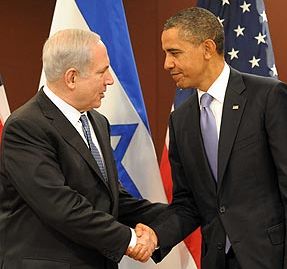Again and again, when Israel has been embroiled in international dustups—over its attack last year on a flotilla filled with activists headed from Turkey to Gaza, to cite but one example—the White House has had Israel’s back. The security relationship between the countries, on everything from intelligence sharing to missile-defense development to access to top-shelf weapons, has never been more robust. And when the Cairo embassy was seized and Netanyahu called to ask for Obama’s help with rescuing the last six Israelis trapped inside the building, the president not only picked up the phone but leaned hard on the Egyptians to free those within. “It was a decisive moment,” Netanyahu recalled after the six had been freed. “Fateful, I would even say.”
All of which raises an interesting, perplexing, and suddenly quite pressing question: How, exactly, did Obama come to be portrayed, and perceived by many American Jews, as the most ardently anti-Israel president since Jimmy Carter?
This meme, of course, has been gathering steam for some time, peddled mainly by right-wing Likudophiles here and in the Holy Land. But last week, it took center stage in the special election in New York’s Ninth Congressional District, maybe the most Jewish district in the nation and one held by Democrats since 1923. When the smoke cleared, the Republican had won—and Matt Drudge was up with a headline blaring REVENGE OF THE JEWS.
Obama’s people deny up and down that the loss of a seat last occupied by Anthony Weiner portends, well, pretty much anything for 2012. But the truth is that they are worried, and worried they should be, for the signs of Obama’s slippage among Jewish voters are unmistakable. Last week, a new Gallup poll found that his approval rating in that cohort had fallen to 55 percent—a whopping 28-point drop since his inauguration. And among the high-dollar Jewish donors who were essential to fueling the great Obama money machine last time around, stories of dismay and disaffection are legion. “There’s no question,” says one of the president’s most prolific fund-raisers. “We have a big-time Jewish problem.”
It’s often said that Netanyahu has an exquisitely calibrated feel for American politics and great savvy in working its press corps. Both are true and both have helped him enormously in resisting the pressure brought to bear by Team Obama. But the administration has also sabotaged itself, in particular by frequently failing to speak with one voice to Israel.
Through much of 2009 and 2010, Obama’s people were divided over just how hard to lean on Netanyahu when it came to negotiating with the Palestinians. On one side were many central figures who favored the tough-love approach: Obama, Clinton, Mitchell, Emanuel. On the other were Dennis Ross, the president’s special assistant on the Middle East, and Tom Donilon, his national-security adviser. “The underlying argument of Dennis and Tom was that you’ll never get the Israelis to do anything by pushing them,” says one official. “The contrary argument is, there’s no evidence you’ll ever get them to do anything without pushing them.”
For Netanyahu, however, the internal division within the administration was a gift. Wary of Emanuel and senior adviser David Axelrod—Netanyahu was quoted in the Israeli press calling them “self-hating Jews,” though he later denied it—he turned to those in the White House who were more sympathetic. “What you had was Bibi doing this go-to-mommy, go-to-daddy thing,” says the same official. “Which meant there was never a real, effective, tough negotiation with Israel, because every time you tried to say something tough, he’d go to someone else who would tell him, ‘Don’t worry about it.’ ”
Netanyahu’s penchant for forum shopping goes a long way toward explaining the bilateral conniption that erupted this past May. After briefly negotiating face-to-face last fall, the Israelis and the Palestinians were again at loggerheads. For weeks this spring, the administration debated internally how to modify U.S. policy in light of that breakdown as well as the dawning of the Arab Spring and the wave of instability engulfing the region.
With the new Republican Congress having invited Netanyahu to address a full joint session—making him only the fourth foreign leader (along with Yitzhak Rabin, Nelson Mandela, and Winston Churchill) to have been granted the privilege more than once—Obama was planning a major speech on the Middle East ahead of Bibi’s. The question was whether the president should lay out a framework for a two-state solution, including principles on borders, security, Jerusalem, and refugees. Clinton and Mitchell were in favor of including all four; Ross and Donilon were in favor of including none, and until a few days before the speech, it appeared that they would have their way. But in the end, Obama opted for two: principles on borders and security.
Everyone knew that the language on borders would stir up a hell of a fuss, though in truth there was nothing terribly controversial about what Obama said. The 1967 lines plus land swaps has been for decades the geographic template for any plausible two-state solution, and was employed (almost fruitfully) by Clinton, Ehud Barak, and Yasser Arafat in 2000 and (again, almost fruitfully) by Bush, Ehud Olmert, and Abbas in 2008. The trouble was that its explicit embrace by Obama caught Netanyahu by surprise, almost certainly because Dennis Ross had assured him privately that it wouldn’t be in the speech.
Netanyahu threw a nutty. Before he departed Israel for Washington, his office issued a statement saying that the “Prime Minister expects to hear a reaffirmation from President Obama of U.S. commitments made to Israel in 2004 … commitments [that] relate to Israel not having to withdraw to the 1967 lines.” The statement was extraordinary on multiple levels: in its sheer presumptuousness (“expects”?); in its willful misreading of Obama’s words (ignoring the part about land swaps); and in its total neglect of the many hard-line pro-Israel positions the president had advanced, including a scornful rejection of the Palestinian statehood bid at the U.N., sharp criticism of Israel-denying Hamas, skeptical questioning of its new alliance with Israel-accepting Fatah, and harsh condemnation of Iran and Syria.
The next day, Netanyahu delivered his on-camera lecture to Obama. What enraged the president and his team wasn’t the impudence on display; they could live with that. It was the dishonesty at the heart of the thing. “I’ve been in more than one meeting with Bibi where he used the same language to describe the outlines of a deal,” one official says. “It’s outrageous—attacking the president for something he didn’t say, claiming he was putting Israel’s security at risk for stating out loud a position Bibi himself holds privately.”
But Netanyahu knew he could get away with it—so staunch and absolute is the bipartisan support he commands in the U.S. Garishly illuminating the point, on the night before his speech to Congress, the prime minister attended the annual AIPAC policy conference in Washington, where he was the headline speaker at the event’s gala banquet. Before he took the stage, three announcers, amid flashing spotlights and in the style of the introductions at an NBA All-Star game, read the names of every prominent person in the room, including 67 senators, 286 House members, and dozens of administration and Israeli officials, foreign dignitaries, and student leaders. (The roll call took half an hour.) When Harry Reid spoke, he obliquely but unambiguously chastised Obama for endorsing the use of the 1967 lines as the basis for a peace deal: “No one should set premature parameters about borders, about building, or about anything else.” The ensuing ovation was deafening—but a mere whisper compared with the thunderous waves of applause that poured over Netanyahu.
The next day came his speech to Congress, in which he spelled out demands that were maximal by any measure: recognition by the Palestinians of Israel as a Jewish state as a precondition for negotiations, a refusal to talk if Hamas is part of the Palestinian side, an undivided Jerusalem as Israel’s capital, and absolutely no right of return for Palestinian refugees. Taken as a whole, his whirlwind Washington visit provided a strong dose of clarity: With Barak having moved his newly formed Independence Party into Netanyahu’s governing coalition, its new stability has reduced to near zero the incentives for him to take the risks required for peace.
In the eyes of some observers, Netanyahu’s performance over those days suggested something else: that he was taking sides in the 2012 race. As Time’s Joe Klein sharply noted, Netanyahu “has now, overtly, tossed his support to the Republicans.” With cover from Bibi, Mitt Romney pronounced that Obama had “thrown Israel under the bus.” Michele Bachmann tweeted that his “call for 1967 borders will cause chaos, division & more aggression in Middle East and put Israel at further risk.” Tim Pawlenty (remember him?) called Obama’s policy “a disaster waiting to happen.” And Ron Paul declared, “Unlike this president, I do not believe it is our place to dictate to Israel how to run her affairs.”
So much pandering, so little time! Republicans sucking up to Israel, and by extension Jewish voters, is nothing new; and in the past, it has come to naught. Might this election be different? Some political professionals think so. The perception of Obama as harboring antipathy to Israel, they argue, makes 2012 a ripe opportunity for the right Republican to swipe a larger than usual share of Jewish votes and/or pick the Obama campaign’s pocket. Skeptical? I would be, too, except for one thing: the sight of the Obamans scrambling to make sure it doesn’t happen.

 The fact that President Obama decided to target the US citizen Anwar Awlaki for extra-judicial execution, is a subject of considerable
The fact that President Obama decided to target the US citizen Anwar Awlaki for extra-judicial execution, is a subject of considerable  In case anyone is in any doubt that President Obama’s comments on the Israeli-Palestinian conflict, delivered to the UN General Assembly this morning, were nothing more than a string of worthless peace-process platitudes, then listen to the rave review he got from Israeli foreign minister
In case anyone is in any doubt that President Obama’s comments on the Israeli-Palestinian conflict, delivered to the UN General Assembly this morning, were nothing more than a string of worthless peace-process platitudes, then listen to the rave review he got from Israeli foreign minister